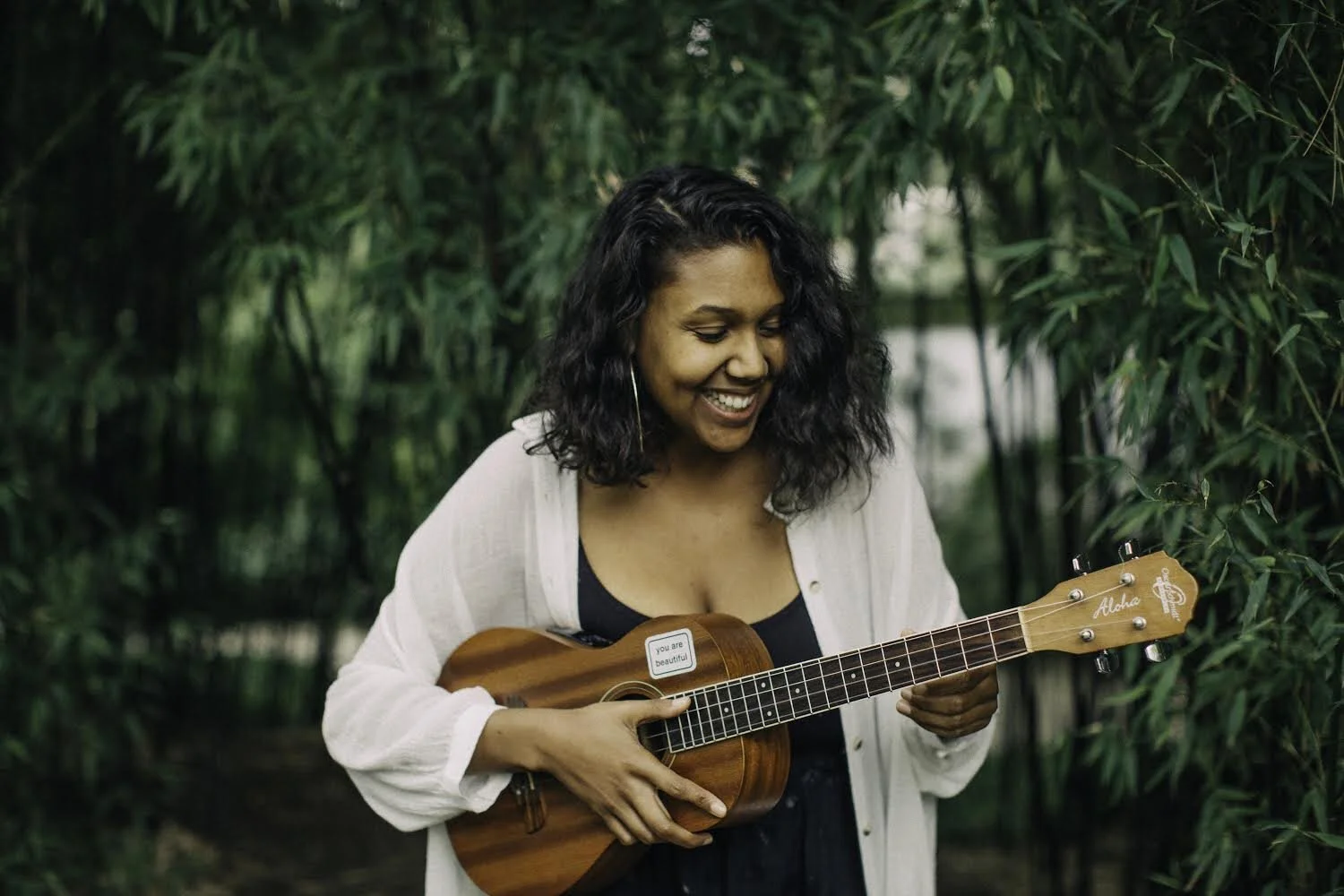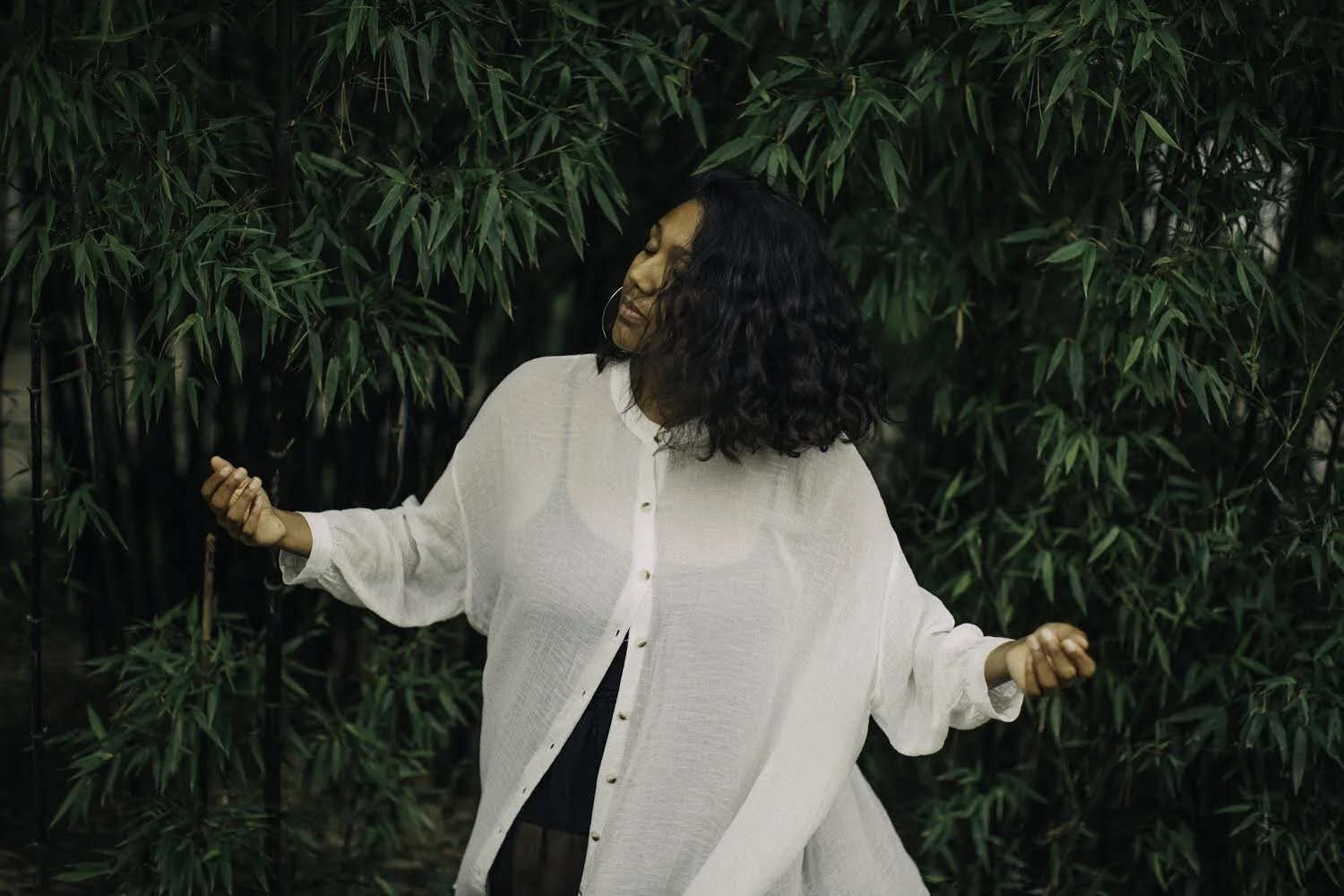Desirée Dawson Funnels Chaos Through Music
By Dayna Mahannah
Desirée Dawson is tired. Still, the singer-songwriter is smiling through her laptop camera over a Zoom call, sitting cross-legged in her Vancouver home. The room is full of art and colour and plants. The sound of the #99 bus beeps somewhere outside her window. In an hour-long conversation, we talk about Dawson’s new album, coronavirus, Black Lives Matter, information integration, and anger. But she’s tired because she spent the morning accompanying a fellow musician to a studio where he filmed a livestream event. A physical studio visit during COVID is novel in a new reality where the definition of “live” has morphed from “in real life” to “in real time.”
Even that definition is mercurial; pseudo-live recordings have captured the spontaneity and visual ambience of music events for decades, flouting space and time altogether. Dawson’s live album, Wild Heart, was recorded at Blue Light studios in December 2019 and finds a place in that intersection of life-affirming characteristics. “It’s live, so nothing could be edited,” she says. “There's a lot of these—in my mind—imperfections in it, which was pretty challenging to just accept.”
Wild Heart: Live from Blue Light Sessions is a revival of her 2017 debut album that was taken down without her consent. The original album was the culmination of her win on Canada’s CBC Searchlight Competition in 2016 and the subsequent collaborative work between her and an assigned team. “The album has had such a journey.” Same songs, now heady with experience. “I have so much more insight on how to move forward and the kind of partnerships I want to be in, and to trust my gut in connections.”
Dawson carries her baritone ukulele with her everywhere. Her voice is robust, gentle. Bubbles bursting against sunlight. Dawson’s music, which is rooted in folk and experiments with electronica, is that kind of simple beauty that allows all else to drop away while it remains distinctive, like a mantra during meditation. Dawson’s music defies chaos and creates space.
“That’s everything I want,” Dawson says, who is also a yoga teacher. “I feel like we’re so…”—she looks around wildly and grabs a pen, clutching it in front of the screen—“we’re like, ‘AHH!’ We’re always doing stuff. Even when we’re stuck at home we’re like, ‘Ahhh! What can I do!? What else can I research?’” Dropping the pen, Dawson laughs. “It’s important work but the slow-down process is so needed.”
She needn’t clarify the universal experience she’s referring to—the bombardment of news and information regarding the Black Lives Matter movement, which The New York Times reports as possibly the largest movement in history, along with constant updates of a reality-altering pandemic.
“It’s so important that we are consuming [information] right now,” she nods, after I tell her the endless data streams make me feel like I can no longer form an original thought. “But we actually weren’t wired to consume so much without an integration process. I’m always curious to find out more but I realize that I'm not always absorbing things. I’ll watch something and I’ll forget it two seconds later because I'm not giving myself space.” Dawson tucks a stray hair behind her ear. “We can be influenced by what we're reading and watching and the conversations that we’re having, but original, new plans and new ways of doing things are needed. We can't have original thoughts unless we have down time.”
Dawson, who grew up as a mixed-race person in White Rock, has been talking about anti-black racism for years and using her platform to share knowledge about the issue. But as her fan base grows, so does Dawson’s anxiety around her social media posts—she must consider her safety over free expression. “I grew up in very white spaces, with white family, as a mixed person. So for me, speaking out in spaces that are very white is really dangerous. I’m still working through the trauma of that and the fact that I've learnt how to walk through the world in a way that was palatable for white people and that wasn't going to ruffle feathers and make them get scared of me or hurt me in any way.”
Meanwhile, the reality of existing, active racism is news to many people. “It's definitely a really heavy time for me, of trying to show up and be loud while also feeling 24-7 triggered.” Recognizing the nuances of the dichotomy of her experience with oppression and privilege as a biracial queer woman while navigating what her role is in the movement has been challenging. “I'm just trying to understand how to show up in a way that is going to be the least harmful to my communities and also to myself.”
Throughout this emotional upheaval—personally and globally—anger has surfaced. On June 26 Dawson posted a video of herself sitting on the floor of her home, singing a stunning freestyle song about processing anger. The caption reads, in part:
Anger is an emotion that has scared me for so long. I’ve often taken any anger and internalized it and felt it as shame. So I’ve been working on allowing my anger to be acknowledged, validated and honoured.
“There’s obviously just being socialized as a woman—there’s all this stuff in there about not being angry,” she remarks. “And then being a black woman is a whole other thing. I believe that we can store emotions in our body. Emotions that go unchecked can turn into illnesses. Anger is a huge one that can really be terrible for us. Even just to sit with it… maybe I don’t know how to express it yet, but acknowledging anger has been helpful.”
On the topic of challenging topics, race and racism is up there. People avoid it, become defensive, talk around it. Silence is Violence has surfaced on many a social media feed and on activist placards globally. The silence is fear—fear of saying the wrong thing, of offending someone, of making a mistake and saying something, well, racist. The old adage, practice makes perfect, may not be 100% accurate, but lack of communication breeds assumptions, obstinance, misunderstanding. Doing self-work is vital—reading Black literature, following Black activists, learning history outside of the Crown syllabus—but theory must be balanced with practice. “Talking about it is literally the most important thing ever right now,” Dawson says. No hyperbole. “There’s only so much you can learn on your own before you have to bring it out in relationships with others. Even when it came to me doing my own self work and being single and trying to go inward, I'm like, okay, I’ve learned so much. I love being alone—so good at being alone!—but how am I in a relationship now? Did I learn anything?”
The tiredness of Dawson’s early morning has volleyed into energy. “First off, we need to accept that we are all racist. Everyone is racist. No matter what you look like, no matter what you say.” A frank laugh falls from her mouth. “You have colonialism within you. Let’s get that out of the way—we’re all racist. Cool. Moving on.” Dawson’s hands dust the other off. “How do we now work to be anti-racist and to take down the systems that have made us all racist? I think a lot of us get stuck in that part of, am I racist or not? I don't know anyone who doesnt have some sort of messed up perception of another group of people. That’s what we were taught. I don't want it to be an excuse, but [we should] have compassion for ourselves as we undo these things. Because we didn't ask for them. But we benefit from them. If we could find ways to let the defensiveness come down so we can actually do the work I think that’s what we need to figure out how to do.”
There is a quote I scavenged from a 2017 interview Dawson did with CBC. I read it to her.
"Everyone around me is yearning for community, for love, for connection in some way or another. Everyone has a different way of describing it, but what it comes down to is getting back to ourselves. Our wild hearts."
It struck me as too relevant in 2020. I asked her if she agreed. “I’ve just kind of noticed it boils down to that with everything. That's what animals want. They just want the basic things but we have gotten so advanced—kind of advanced, which has also been a disadvantage to us. I don't know when this quote will ever stop being relevant. This is what we want all the time, I guess. Connection.”
Wild Heart: Live from Blue Light Sessions will be released July 30. Dawson performs “live” on August 9th through Side Door Access. Tickets $20. All proceeds go to Hogan’s Alley Society and Urban Native Youth Association.


